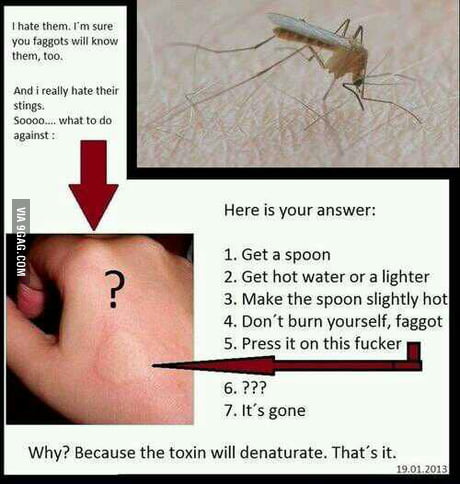Mosquito bites can be painful and itchy and are caused by a variety of mosquito species and varieties
All of these mosquito bites have a single reason, to provide the mosquito larvae with a nourishing diet. Each mosquito will bite the person who has bitten him or her.
A mosquito bite is any one of about three thousand species of small insect belonging to the genus Culex. In Culex, mosquitoes form the Order Culiciformes. The term "mosquito" means "little fly." The mosquitoes in this order are called Culicidae, or "flies of the ground." They are called "flies" because they don't breathe, but feed on their food rather than breathing it out. They are the largest of the flying insects and they have no wings, but they do fly by gliding on a flat surface.
Female mosquitoes lay up to fifty thousand eggs which hatch and live for about two weeks, while the larvae become wingless. By the time the larvae become wingless, they are too small to fly. As they grow into winged adults they carry wingless larvae with them. These larvae will develop into wingless adults when they mate and reproduce, but for this reason the name "mosquitoes" is applied to all stages of the life cycle of the mosquito, from eggs to adult mosquitoes.
Adult mosquitoes are called Aedes species. Adult mosquitoes are found all over the world and are often referred to as mosquito bites. Some mosquitoes are also found inside the home, where they are attracted to moist areas such as furniture and carpets. Adults are the same size as pupae, but they are fully grown by the time they emerge as winged adults. They will eat almost any type of insect and will bite humans who come in their way.
An adult mosquito's bite can result in a painful itching sensation. It can cause a burning or stinging sensation in the skin and in rare cases can cause swelling of the area. In rare instances an adult mosquito can bite an open wound and cause blisters to form.

There are many types of mosquito bites, including common mosquito bites that cause skin irritation and more serious infections caused by certain bacteria. which affect the blood cells of the skin. These bacteria can travel through the bloodstream to other parts of the body, causing infection. To get proper treatment and prevent this infection, doctors will do a test, known as culture, to identify the species that carry the disease and the organism that caused it. Treatment for the infection will be prescribed to prevent bacteria from reoccurring in the future.
This is done by placing a drop of the patient's blood on a microbe sample and analyzing it under a microscope
Some other mosquito bites can be the result of diseases transmitted to humans by mosquitoes. These mosquitoes carry bacteria such as dengue and yellow fever. These organisms may not cause symptoms during exposure. They only appear after years of continuous contact with people.
In severe cases of mosquito bites, skin rashes or blisters may result from the bite. If irritated blisters may rupture and bleed. They are not dangerous and can be treated with creams or ointments. If they become infected, they can burst and cause scarring. bleeding can also occur during blood transfusion. Blisters heal over time, but scars may remain until the skin is completely healed.
There are also some cases where mosquito bites have been known to cause serious diseases and infections. They include the more serious diseases caused by bacteria that can cause a high fever, kidney failure, and even death if the bacteria is left untreated. These bacteria can cause the spread of HIV and AIDS.
These bacteria are especially dangerous because they can travel easily through the blood stream and can spread to people with the slightest signs of illness. The first sign of a serious disease is a fever and a rash on the body. This rash and fever can spread to other parts of the body and cause complications.
Serious mosquito bites should be treated by a doctor and left alone until they heal. They can cause permanent damage and complications if not treated promptly.